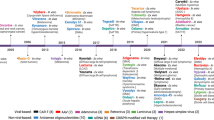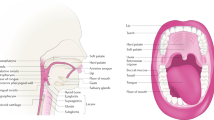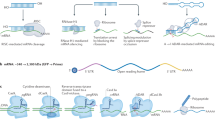Abstract
Existing local therapies for superficial transitional cell carcinoma (TCC) of the bladder have limited success in preventing progression to life-threatening, muscle-invasive disease, and novel therapies are needed. Recent studies have raised doubts concerning the feasibility of adenovirus-mediated gene therapy for bladder cancer. We have therefore investigated adenoviral transduction of normal and malignant human urothelial cells, both as primary cultures and in intact epithelium.
All 15 primary normal human urothelial cell lines tested were transduced in vitro by Adv-cmv-β-gal at high efficiency, and better than most human TCC cell lines. Eight primary human TCC explants were also successfully transduced. In contrast, in intact normal urothelium, transduction efficiency was lower, and occurred only in superficial epithelial layers. Expression of the hCAR adenovirus receptor, however, occurred throughout the full thickness of urothelium. Transduction of human TCC biopsy specimens was at least as efficient as intact normal urothelium.
We demonstrate for the first time that adenoviral transduction of both normal and malignant human urothelial cells is feasible. A physical barrier, rather than hCAR status, may be the main determinant of transduction of intact epithelium. Clinical trials of adenovirus-mediated gene therapy for superficial bladder cancer are warranted.
This is a preview of subscription content, access via your institution
Access options
Subscribe to this journal
Receive 12 print issues and online access
$259.00 per year
only $21.58 per issue
Buy this article
- Purchase on Springer Link
- Instant access to full article PDF
Prices may be subject to local taxes which are calculated during checkout




Similar content being viewed by others
References
Greenlee RT, Murray T, Bolden S, Wingo PA . Cancer statistics, 2000. CA Cancer J Clin 2000; 50: 7–33.
Hassen W, Droller MJ . Current concepts in assessment and treatment of bladder cancer. Curr Opin Urol 2000; 10: 291–299.
Heney NM et al. Superficial bladder cancer: progression and recurrence. J Urol 1983; 130: 1083–1086.
Knowles MA . The genetics of transitional cell carcinoma: progress and potential clinical application. BJU Int 1999; 84: 412–427.
Perrotte P et al. Biosafety of in vivo adenovirus-p53 intravesical administration in mice. Urology 2000; 56: 155–159.
Wood M et al. Biodistribution of an adenoviral vector carrying the luciferase reporter gene following intravesical or intravenous administration to a mouse. Cancer Gene Ther 1999; 6: 367–372.
Anidjar M et al. Ureteral gene transfer to porcine induced strictures using endourologic delivery of an adenoviral vector. J Urol 1999; 161: 1636–1643.
Bass C et al. Recombinant adenovirus-mediated gene transfer to genitourinary epithelium in vitro and in vivo. Cancer Gene Ther 1995; 2: 97–104.
Morris BD Jr et al. Adenoviral-mediated gene transfer to bladder in vivo. J Urol 1994; 152: 506–509.
Sutton MA et al. Adenovirus-mediated suicide gene therapy for experimental bladder cancer. Urology 1997; 49: 173–180.
Werthman PE et al. Adenoviral-p53 gene transfer to orthotopic and peritoneal murine bladder cancer. J Urol 1996; 155: 753–756.
Li Y et al. Loss of adenoviral receptor expression in human bladder cancer cells: a potential impact on the efficacy of gene therapy. Cancer Res 1999; 59: 325–330.
McDonald D et al. Coxsackie and adenovirus receptor (CAR)-dependent and major histocompatibility complex (MHC) class I-independent uptake of recombinant adenoviruses into human tumour cells. Gene Ther 1999; 6: 1512–1519.
Hsu KH, Lonberg-Holm K, Alstein B, Crowell RL . A monoclonal antibody specific for the cellular receptor for the group B coxsackieviruses. J Virol 1988; 62: 1647–1652.
Engler H et al. Ethanol improves adenovirus-mediated gene transfer and expression to the bladder epithelium of rodents. Urology 1999; 53: 1049–1053.
Hutchin ME, Pickles RJ, Yarbrough WG . Efficiency of adenovirus-mediated gene transfer to oropharyngeal epithelial cells correlates with cellular differentiation and human coxsackie and adenovirus receptor expression. Hum Gene Ther 2000; 11: 2365–2375.
Watanabe T et al. An improved intravesical model using human bladder cancer cell lines to optimize gene and other therapies. Cancer Gene Ther 2000; 7: 1575–1580.
Connor RJ et al. Identification of polyamides that enhance adenovirus-mediated gene expression in the urothelium. Gene Ther 2001; 8: 41–48.
Siemens DR et al. Evaluation of gene transfer efficiency by viral vectors to murine bladder epithelium. J Urol 2001; 165: 667–671.
Walters RW et al. Basolateral localization of fiber receptors limits adenovirus infection from the apical surface of airway epithelia. J Biol Chem 1999; 274: 10219–10226.
Loskog A et al. Human urinary bladder carcinomas express adenovirus attachment and internalization receptors. Gene Ther 2002; 9: 547–553.
Kuball J et al. Successful adenovirus-mediated wild-type p53 gene transfer in patients with bladder cancer by intravesical vector instillation. J Clin Oncol 2002; 20: 957–965.
Emiliusen L et al. A transcriptional feedback loop for tissue-specific expression of highly cytotoxic genes which incorporates an immunostimulatory component. Gene Ther 2001; 8: 987–998.
Bateman A et al. Fusogenic membrane glycoproteins as a novel class of genes for the local and immune-mediated control of tumor growth. Cancer Res 2000; 60: 1492–1497.
Kirn D . Clinical research results with dl1520 (Onyx-015), a replication-selective adenovirus for the treatment of cancer: what have we learned? Gene Ther 2001; 8: 89–98.
Rogulski KR et al. Double suicide gene therapy augments the antitumor activity of a replication-competent lytic adenovirus through enhanced cytotoxicity and radiosensitization. Hum Gene Ther 2000; 11: 67–76.
Fueyo J et al. A mutant oncolytic adenovirus targeting the Rb pathway produces anti-glioma effect in vivo. Oncogene 2000; 19: 2–12.
Heise C et al. An adenovirus E1A mutant that demonstrates potent and selective systemic anti-tumoral efficacy. Nat Med 2000; 6: 1134–1139.
Hutton KA, Trejdosiewicz LK, Thomas DF, Southgate J . Urothelial tissue culture for bladder reconstruction: an experimental study. J Urol 1993; 150: 721–725.
Reznikoff CA, Johnson MD, Norback DH, Bryan GT . Growth and characterization of normal human urothelium in vitro. In Vitro 1983; 19: 326–343.
Reznikoff CA et al. Growth kinetics and differentiation in vitro of normal human uroepithelial cells on collagen gel substrates in defined medium. J Cell Physiol 1987; 131: 285–301.
Knowles MA, Hicks RM, Berry RJ, Milroy E . Organ culture of normal human bladder: choice of starting material and culture characteristics. Methods Cell Biol 1980; 21B: 257–285.
Knowles MA et al. Long-term organ culture of normal human bladder. Cancer Res 1983; 43: 374–385.
Scriven SD et al. Reconstitution of human urothelium from monolayer cultures. J Urol 1997; 158: 1147–1152.
Mittereder N, March KL, Trapnell BC . Evaluation of the concentration and bioactivity of adenovirus vectors for gene therapy. J Virol 1996; 70: 7498–7509.
Ji L et al. Reduced toxicity, attenuated immunogenicity and efficient mediation of human p53 gene expression in vivo by an adenovirus vector with deleted E1–E3 and inactivated E4 by GAL4-TATA promoter replacement. Gene Ther 1999; 6: 393–402.
Acknowledgements
We thank our surgical colleagues in the Pyrah Department of Urology at St. James's Hospital and the patients who consented to provide bladder tumour biopsy samples. Our thanks are also due to Jon Laye for specimen collection and processing, Eva Pitt for advice on organ culture techniques, Pat Harnden for expert histological staging of tumour specimens, and Christine Gascoigne and Ailsa Rose for processing of wax-embedded specimens. We are grateful to Poulam Patel, Andrew Jackson, Mick Brown and Susan Hedley for critical reading of the manuscript. Monoclonal antibody RmcB was a gift from J Bergelson, Children's Hospital of Philadelphia, PA, USA. These data were presented in poster form at a poster discussion session at ECCO 11, Lisbon, Portugal, October 2001.
Author information
Authors and Affiliations
Rights and permissions
About this article
Cite this article
Chester, J., Kennedy, W., Hall, G. et al. Adenovirus-mediated gene therapy for bladder cancer: efficient gene delivery to normal and malignant human urothelial cells in vitro and ex vivo. Gene Ther 10, 172–179 (2003). https://doi.org/10.1038/sj.gt.3301851
Received:
Accepted:
Published:
Issue Date:
DOI: https://doi.org/10.1038/sj.gt.3301851
Keywords
This article is cited by
-
Immune Therapies in Non-Muscle Invasive Bladder Cancer
Current Treatment Options in Oncology (2015)
-
Retargeted adenoviral cancer gene therapy for tumour cells overexpressing epidermal growth factor receptor or urokinase-type plasminogen activator receptor
Gene Therapy (2010)



